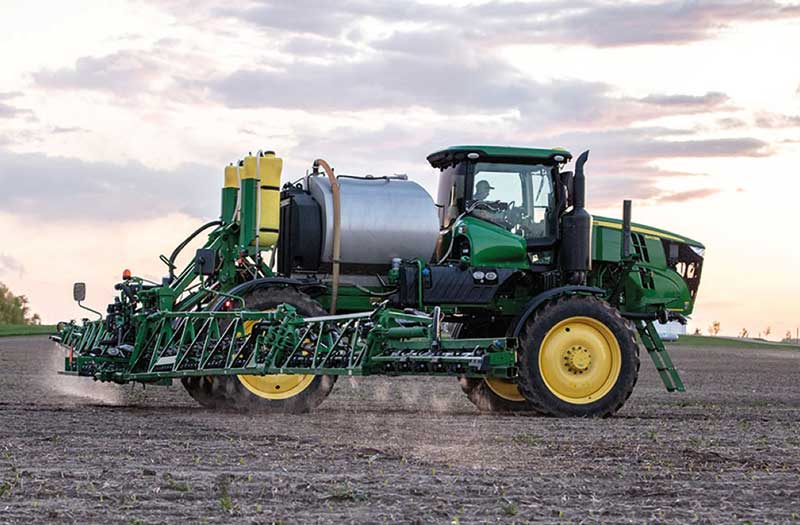Background
Ammonium sulphate has been used with cation-sensitive herbicides like glyphosate for about forty years. It is probably one of the most successful and long-lived adjuvants that the industry has seen. The ammonium sulphate adjuvants have evolved over the years, and many improvements have been made. Firstly, the product quality has improved exponentially, and fertiliser-grade ammonium sulphate has been replaced with spray-grade quality. The granular products were introduced later to slash the transport costs and packaging space. Villa’s latest innovation was to introduce a premium product called CLASS ACT® NG. It contains ammonium sulphate, a surfactant, a humectant and a defoamer for optimal glyphosate efficacy.
Although Villa’s granular version, namely VELOCITY® DRYMAX has reduced the transport costs tremendously, it remains a high-volume adjuvant. Therefore, there is an incentive to use ultra-low-rate water conditioners to slash the transport costs even further. These products typically contain active ingredients like DTPMPA + ATMPA, carbohydrate complexes and phosphoric acid, and are applied at rates of up to 100 ml/100 L, depending on water quality. Therefore, if the maximum rate is recommended, it is at least tenfold lower than the CLASS ACT® NG rate.
Therefore, Villa decided to test two of these products to determine if they were as effective as our ammonium sulphate products in both chemical studies and efficacy trials. If we could prove efficacy, we could replace the ammonium sulphate and cut transport costs by at least tenfold.
Why certain herbicides are so sensitive to dissolved cations in water
For the aim of this discussion, glyphosate will be used as an example for all these herbicides. Because of the structure and functional groups of the glyphosate molecule, it binds to antagonistic cations and forms inactive and poorly absorbed complexes. Figure 1 shows a glyphosate complex formed with calcium.

Figure 1: The distortion of the glyphosate molecule by a divalent cation like Ca2+.
This reduces efficacy because a crusty, viscous deposit (droplet after the water has evaporated) is formed that is not absorbed adequately (Photos 1 & 2). It was determined in lab studies that the absorption of glyphosate is reduced from 59% in distilled water, to 1% with calcium water and 21% with sodium water! Therefore, something needs to be done to reduce this antagonism and to increase glyphosate absorption and weed control. Villa’s solution has always been to use ammonium sulphate-containing adjuvants.
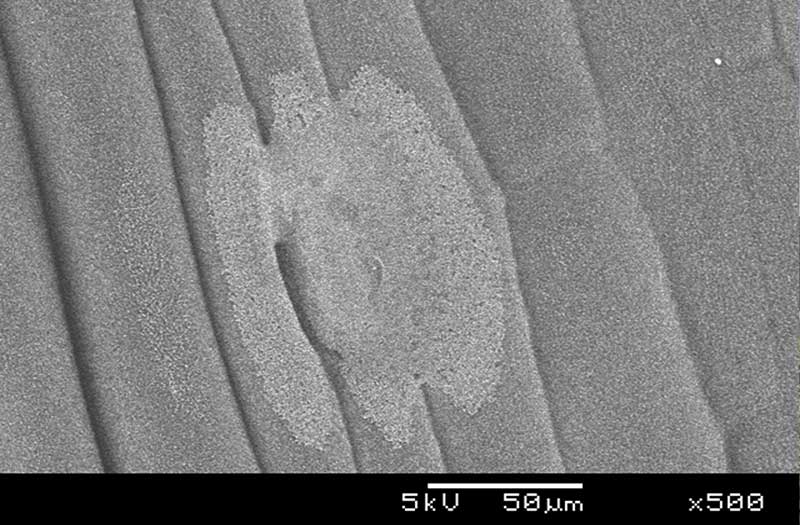
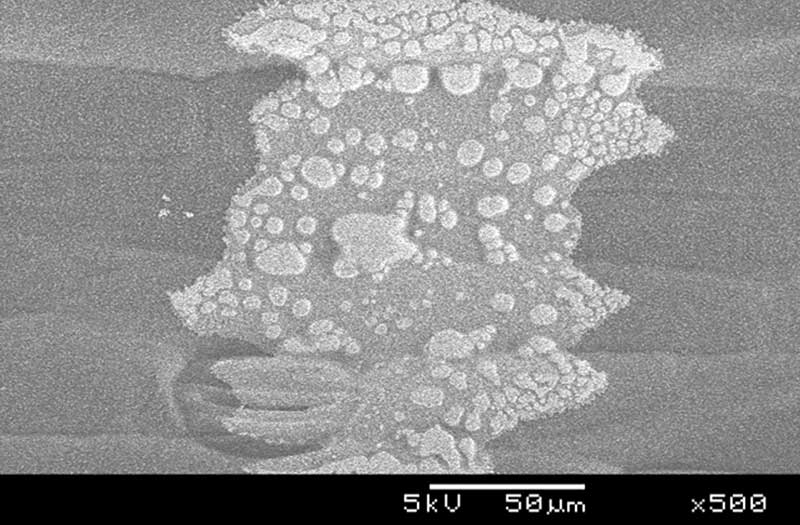
Ammonium sulphate is a trusted product to eliminate antagonism
Ammonium sulphate and other water conditioners can bind (complex) antagonistic cations. In the case of ammonium sulphate, this occurs on the weed leaf, as the droplet is drying. When ammonium sulphate is used in water that contains cations, the sulphate anion binds to the cation before the cation can bind to the glyphosate. With calcium, it forms insoluble gypsum (calcium sulphate), that is precipitated early during droplet drying. This is clearly illustrated in Figure 3 where a dried-out droplet deposit shows the star-shaped calcium sulphate crystals. Because the sulphate anion binds to the antagonistic cations, the glyphosate is free to be absorbed unhindered. This improves weed control and cations in spray water play no further role. Because of their low use rate, it is important to test if the so-called ammonium sulphate replacement adjuvants have the same ability.
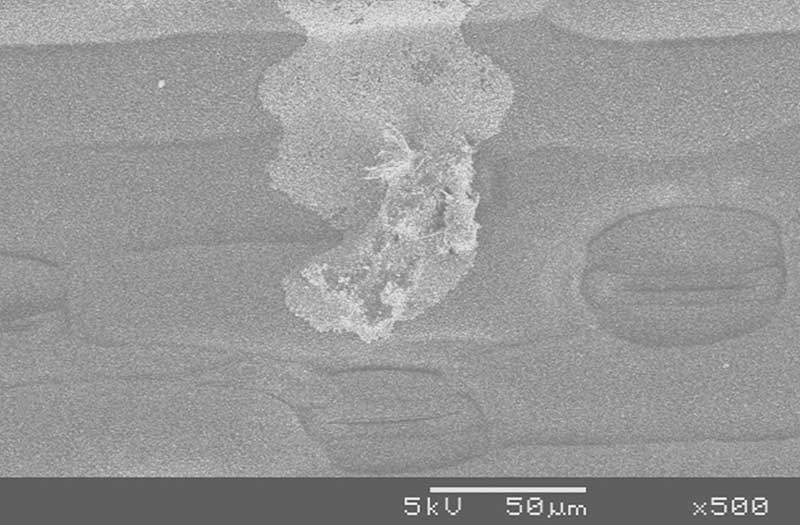
Chemistry study
The first step in the chemical study was to determine the complexing ability of the replacement chemicals versus ammonium sulphate. Table 1 shows that none of the replacement products, at the same rate, are more effective to neutralise calcium. This is great cause for concern because the replacement products are used at a fraction of the rate.
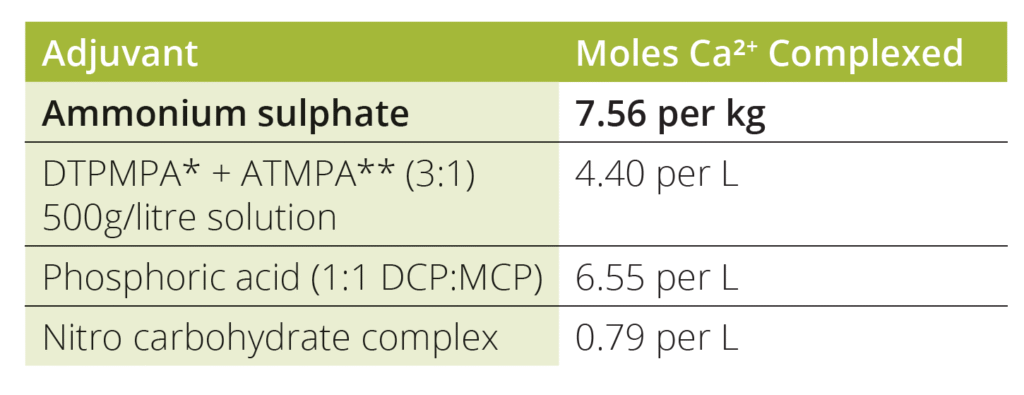
A huge advantage of ammonium sulphate is that the formation of the calcium sulphate complex (Photo 3) is complete and irreversible. This means that all the calcium and other cations are neutralised, if enough ammonium sulphate is used. After this, the antagonistic cation cannot go into solution again to antagonise the herbicide.
Chelating-type replacement products have a totally different mode of action. The process is reversible; therefore, it will compete with glyphosate for the cation. The functional groups that form part of the glyphosate molecule are very similar to functional groups present in these products, therefore there will always be a certain percentage of antagonistic cations that bind to and antagonise the glyphosate. This will have a direct negative impact on weed control. The ultra-low rates of these products make it even more of a concern.
Efficacy studies
The only way to prove our concern was to test glyphosate in both glasshouse and field trials with these products. In glasshouse trials 1 and 2, two of these products were tested against VELOCITY® DRYMAX . These trials were done with water that all contained the same amount of calcium. The rates of all the products were adjusted for this type of water according to the recommended rates. In Trial 1 we also used VELOCITY® DRYMAX at low rates to test its efficacy at similar rates to the replacement product. In all the trials, the glyphosate control alone was poor, due to the low rate. This is an accepted practice to determine adjuvant suitability, and it is endorsed by leading research institutes.
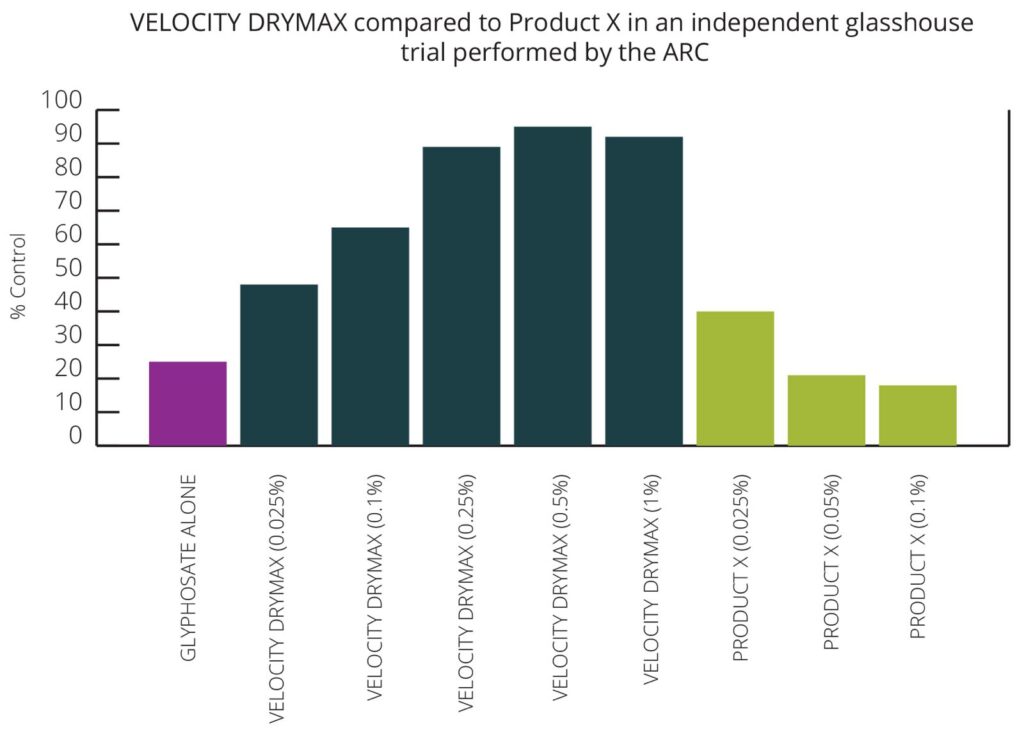
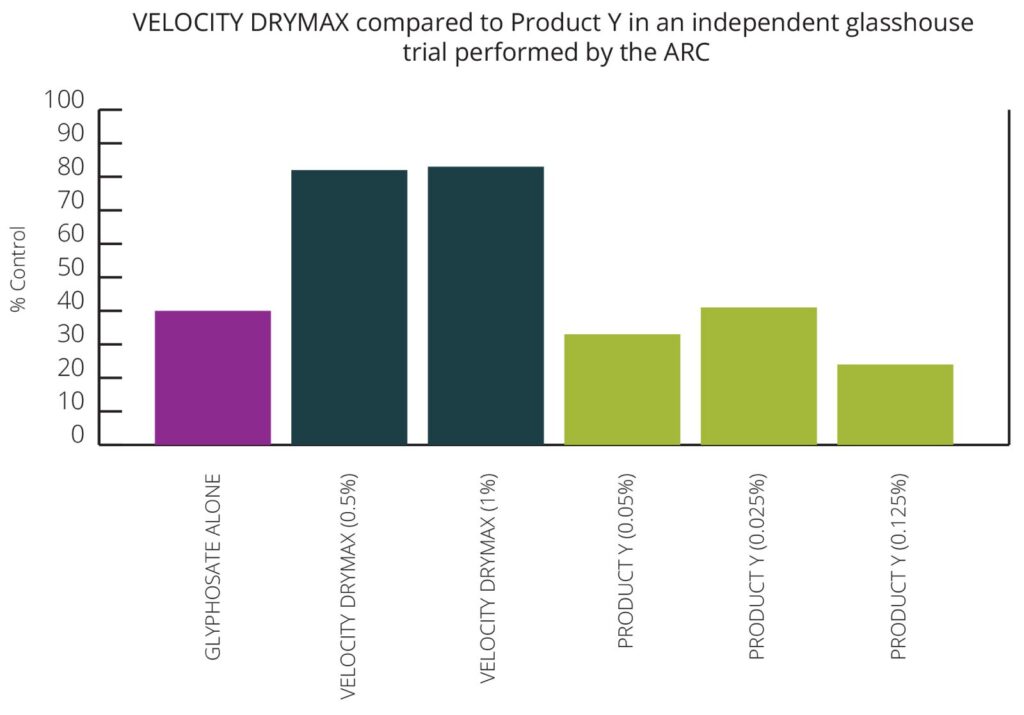
In the field trial, CLASS ACT® NG and both replacement products were applied with glyphosate in calcium-containing water. To compare apples with apples, we added 0.1% VILLA 51 to the replacement adjuvants. This is because CLASS ACT® NG contains a surfactant, and we only wanted to test the water conditioning ability of the products, and not the surfactant effect. The results speak for themselves. The Villa products containing ammonium sulphate gave much more effective weed control.
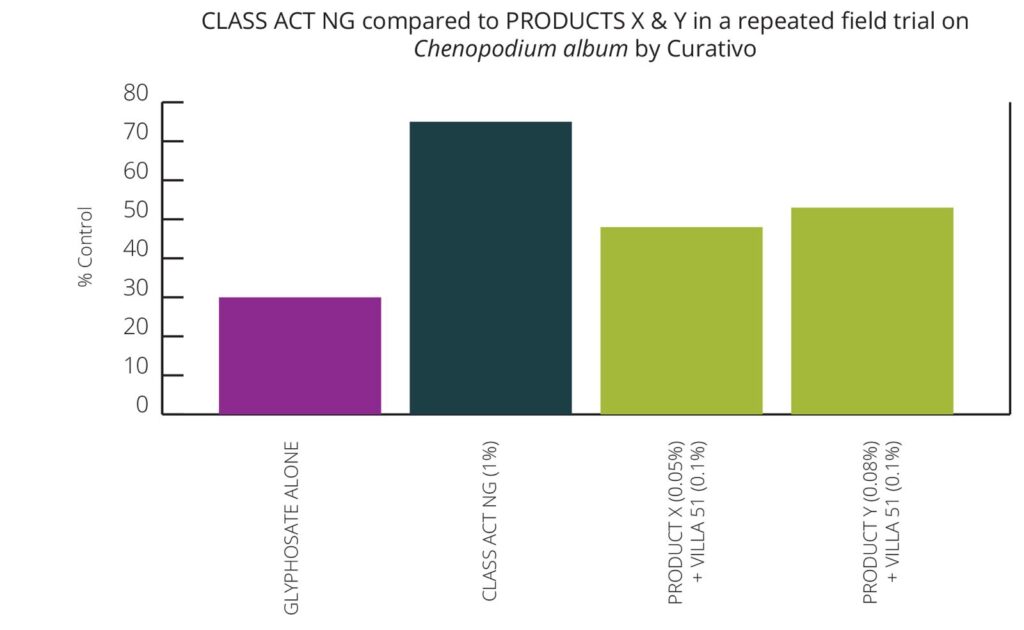
More reasons to use ammonium sulphate
Moreover, ammonium sulphate has two important additional advantages. Firstly, in many of our trials, ammonium sulphate increased glyphosate efficacy, even when the water contained almost no cations. This is because of the vital function of the ammonium cation that increases absorption. Secondly, Villa products like VELOCITY® DRYMAX can overcome the antagonism of phenoxy herbicides on glyphosate (Refer to the VELOCITY® DRYMAX label). This is an extremely important advantage, because these mixtures are used frequently in many parts of South Africa.
Conclusion
After doing the lab trials, chemical studies, glasshouse and field trials, Villa is convinced that the only water-conditioners that are suitable for our cation-sensitive herbicides, are CLASS ACT® NG and VELOCITY® DRYMAX. At this stage, we cannot endorse the use of any other water conditioners with the Villa glyphosate products or other cation-sensitive herbicides.
Registration details:
CLASS ACT® NG. Reg. No. L 10477 Act No. 36 of 1947 / W 1301268. Active ingredient: Ammonium sulphate + non-ionic surfactant 480 gℓ. Warning. Hazard Statements: Causes eye irritation. Precautionary Statements: Wash skin and eyes thoroughly after handling. Do not touch eyes. IF IN EYES: Rinse cautiously with water for several minutes. Remove contact lenses, if present and easy to do so. Continue rinsing. Registration holder: Winfield Solutions Registration Holdings (Pty) Ltd. Reg. No. 2015/312008/07. PO Box 10413, Aston Manor, 1630. Tel. (011) 396-2233
VELOCITY® DRYMAX. Reg no. L9454 Act no 36 of 1947 / N-AR 1528 / W 130995. Active ingredient: ammonium sulphate 1000g/kg. Warning. Hazard Statements: May be harmful if swallowed. Precautionary Statements: If swallowed: Get medical help. Registration holder: UNIVERSAL CROP PROTECTION (PTY) LTD. Co. Reg. No. 1983/008184/07. P.O. Box 801, Kempton Park, 1620. Tel. (011) 396 2233
Villa 51. Reg. No. L 8050 Act No. 36 of 1947. Active ingredient: Isotridecanol (alkylpolyethylene glycol ether) 918 g/l. Warning. Hazard Statements: Very toxic to aquatic life. Harmful to aquatic life with long-lasting effects. Precautionary Statements: Avoid release to the environment. Collect spillage. Dispose of contents/container in accordance with local regulations. Registration holder: UNIVERSAL CROP PROTECTION (PTY) LTD. Co. Reg. No. 1983/008184/07. P.O. Box 801, Kempton Park, 1620. Tel. (011) 396 2233
